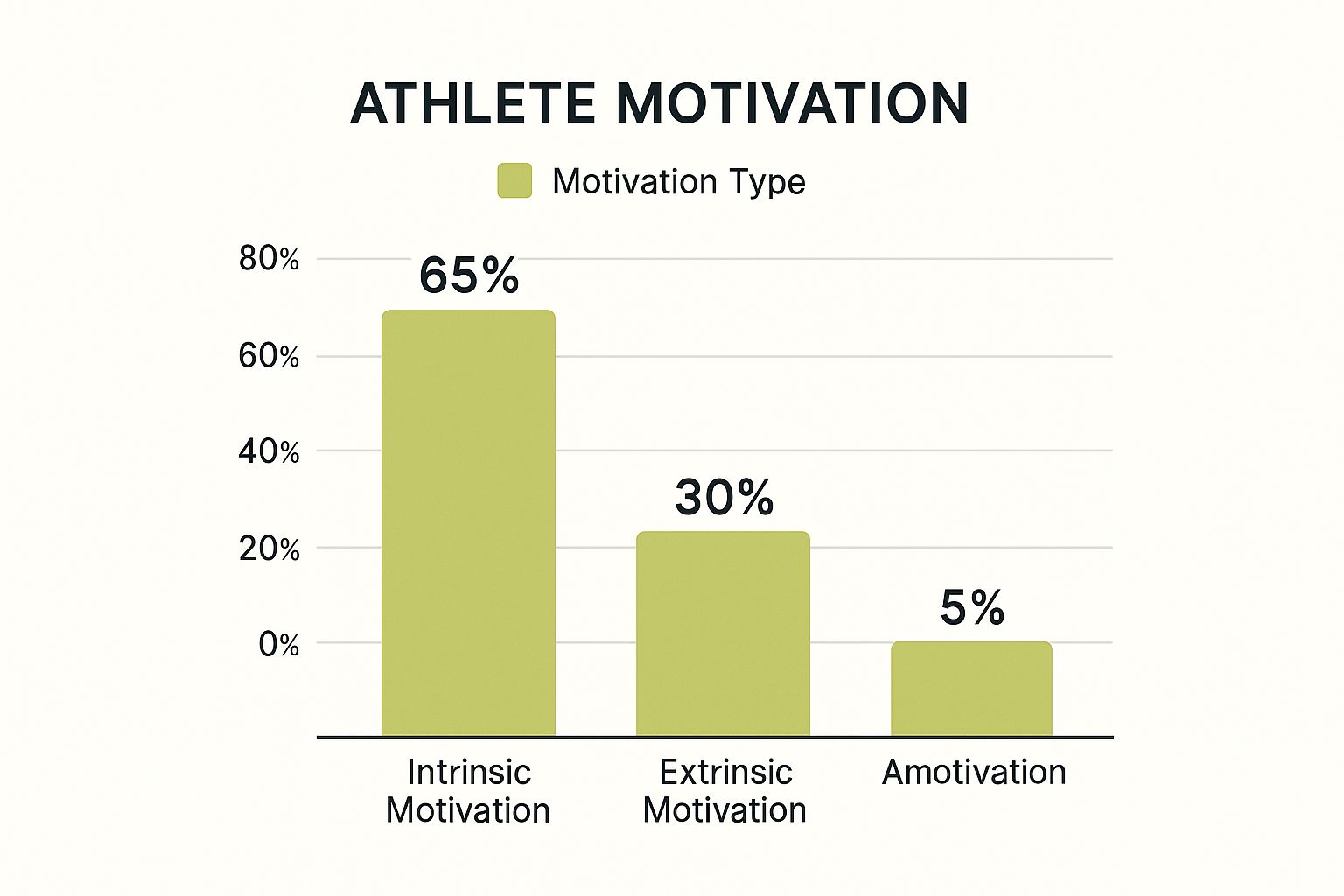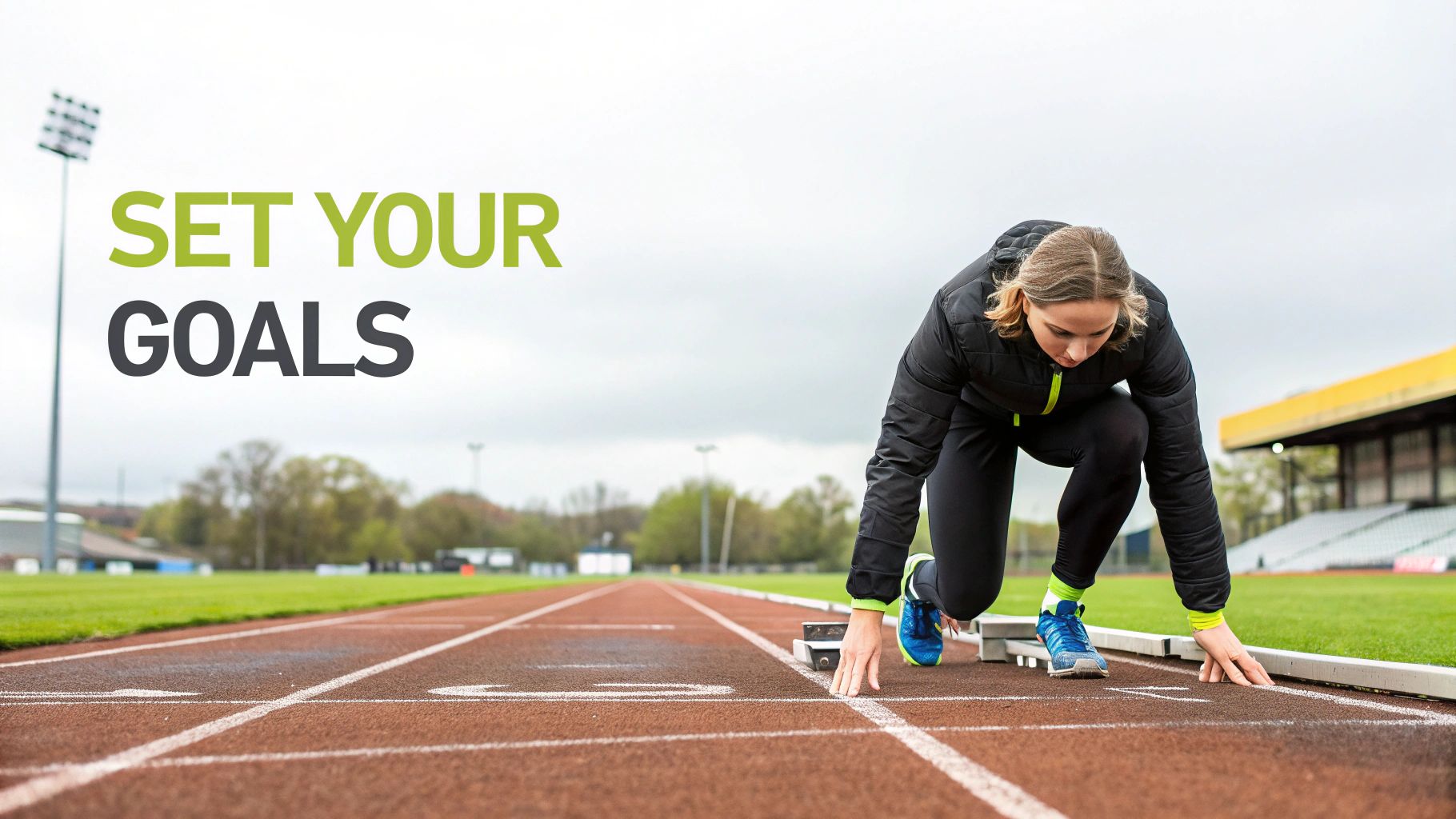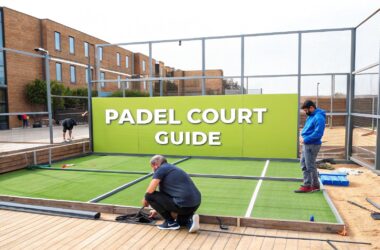When it comes to padel, sports psychology is that invisible edge. It's the force that turns a good player into a great one, shaping your resilience, focus, and ultimately, your success on the court. It's all about building a mental foundation that fuels your drive, helping you push through tough moments in practice and thrive when the pressure is on in a real match.
The Mental Edge in Padel
Sure, technique and fitness are crucial. We all know that. But the mental game is where padel matches are so often won or lost. What really gets a player through a grueling third set or helps them bounce back after a string of frustrating unforced errors? It's not just some vague "will to win"; it's the quality of their motivation.
This is exactly why sports psychology principles are so powerful. The first step to building a rock-solid, consistent mindset is to truly understand what drives you—is it an internal fire, or are you chasing external rewards?
Intrinsic vs. Extrinsic Drivers
Your motivation in padel generally boils down to two main types:

Buy the best padel gear to level up your next game!
CHECK OUT this deal from Padel Market!Get ready to take your game to the next level with the latest padel gear from Padel Market! Fast EU and Worldwide Shipping
- Intrinsic Motivation: This is the stuff that comes from within. You play because you just love the challenge, the feeling of finally mastering a tricky shot like the bandeja, or the unique camaraderie you have with your partner. This kind of motivation is directly linked to long-term enjoyment and sticking with the sport.
- Extrinsic Motivation: This drive comes from the outside world. Maybe you're playing to win a trophy, earn some prize money, or hear praise from your coach and teammates. While these can give you a nice short-term boost, relying only on them can make your motivation fragile. One tough loss, and that drive can vanish.
"Success isn't owned. It's leased, and rent is due every day." – J.J. Watt
This quote nails the essence of intrinsic motivation. It’s about showing up every day and putting in the work, not just dreaming about the final trophy.
And the research backs this up. A fascinating study involving 500 Spanish athletes discovered that those with high intrinsic, achievement-focused goals were the most likely to compete at an international level. On the flip side, athletes driven by a fear of failure were far less successful. It's a clear signal that your internal mindset is a massive predictor of your potential. You can dive deeper into these findings by checking out the full study on motivation quality and performance.
To better understand your own drivers, it helps to see how different motivational profiles play out.
Four Core Motivational Profiles in Athletes
This table breaks down the common mindsets you'll find in athletes. See if you can spot your own dominant style.
| Motivational Profile | Primary Driver | Typical Mindset | Performance Impact |
|---|---|---|---|
| The Achiever | Internal satisfaction, mastery | "I want to be the best I can be. I love improving my skills." | High consistency, resilience, and long-term success. |
| The Social Player | Connection, teamwork | "I love the community and playing with my friends/partner." | Strong team cohesion, but may lack a competitive edge. |
| The Reward-Seeker | Trophies, status, recognition | "I'm playing to win that tournament and get the prize." | Can be highly effective in the short-term, but motivation is vulnerable to losses. |
| The Avoider | Fear of failure, avoiding mistakes | "I just don't want to mess up or look bad on the court." | Leads to tentative play, anxiety, and limited growth. |
Recognizing where you fall can be the first step toward shifting your focus to a more sustainable, performance-driving mindset.
This chart really drives the point home, showing the typical motivational split among dedicated athletes.

As you can see, a self-driven mindset, with 65% coming from intrinsic motivation, is the engine for most serious athletes. Your goal should be to cultivate that same internal fire to power your own padel journey.
Building Your Intrinsic Motivational Toolkit

Knowing what gets you fired up is one thing. But actually using that knowledge to win more points on the court? That’s where the magic really happens. To get there, we can lean on a powerful framework from sports psychology called Self-Determination Theory (SDT).
Don't let the fancy name fool you. The idea is simple: every player is driven by three basic psychological needs. When you meet these needs, your internal motivation goes through the roof. When you don't, you start feeling stuck, frustrated, or even burnt out.
And this isn't just theory. Research backs it up, showing that when athletes feel a sense of competence, autonomy, and relatedness, they're more engaged and far less likely to quit.
So, let's break down these three pillars and turn them into a practical toolkit for your padel game.
Take Ownership with Autonomy
First up is autonomy. This is simply the feeling that you're in the driver's seat of your own padel journey. You're making the calls, not just following orders.
A great way to boost your sense of autonomy is to take charge of your practice sessions. Instead of just mindlessly hitting balls, sit down with your partner and design a drill session that attacks a weakness you both want to fix. That small act of shared decision-making gives you an immediate sense of control.

Buy the best padel gear to level up your next game!
CHECK OUT this deal from Padel Market!Get ready to take your game to the next level with the latest padel gear from Padel Market! Fast EU and Worldwide Shipping
It works in matches, too. Don’t just blindly follow what your partner or coach says. Talk it out before the match. How do you both want to play against this specific pair? Coming up with a game plan together satisfies that need for autonomy and gets you both invested.
Build Your Sense of Competence
Next is competence, which is the deep satisfaction you get from feeling skilled and effective. It's that buzz when you nail a perfect shot or see real, tangible improvement in your game. This is a massive part of sports psychology motivation.
Building competence is all about chasing small, measurable wins.
- Master One Shot: Forget trying to fix everything at once. Dedicate a whole month to just the bandeja or the chiquita. Keep a mental or physical tally of your success rate in drills and matches.
- Improve Serve Accuracy: Don't just serve. Aim for specific spots. Set a goal to hit the "T" 7 out of 10 times. Watching that number climb is an incredible motivator.
- Celebrate Defensive Wins: Did you just dig out a seemingly impossible smash? Celebrate that! Recognizing skillful defensive plays builds a ton of self-belief, even if you don't win the point.
When you can actually feel yourself getting better, the desire to play more comes naturally. Of course, there will be tough days, and overcoming feeling unmotivated is a skill in itself, but focusing on competence gives you a solid foundation.
Connect Through Relatedness
Finally, there's relatedness—our fundamental need to feel connected to others. In a doubles game like padel, this is absolutely crucial. It’s all about the bond you have with your partner and feeling like you belong to the wider padel community.
A strong partnership isn't just about good shots; it's built on trust and communication. Celebrate your victories together, but more importantly, have each other's backs after a tough loss without pointing fingers. That connection makes the game so much more rewarding.
You can also satisfy this need by getting more involved with your local club, joining social events, or even becoming a certified coach. If you've ever considered that path, our guide on how to become a padel coach has some fantastic starting points.
By actively working on your autonomy, competence, and relatedness, you build a motivational engine that doesn't rely on trophies or rankings. You're creating a resilient, lasting passion for padel that comes from within.
Develop Unshakeable Focus and In-Game Resilience
If intrinsic motivation is the engine that gets you to the court, then focus and resilience are the steering wheel and suspension. They're what get you through the bumps, twists, and turns of a tough, competitive match. This is where your mental game is truly tested—when the pressure builds, the crowd gets loud, and every single point feels massive.
The biggest difference I see between players who thrive under pressure and those who crumble often comes down to their mental routines. We're not talking about complicated psychological theories here. These are simple, repeatable actions you can take to anchor your mind and stay locked in the present moment. One of the most powerful tools in this arsenal is the attentional cue.
Simply put, an attentional cue is a tiny, specific thing you focus on to silence all that mental chatter. For instance, right before you return a serve, instead of the classic "Don't mess this up," try shifting your entire focus to the seams of the spinning padel ball. It’s a small trick, but it short-circuits anxiety and pulls you right into the task at hand.
Mastering the Next Point Mentality
We've all been there. You shank one easy bandeja, and suddenly that single mistake snowballs into a lost game, then a lost set. It’s a frustratingly common experience. The pros have a powerful way of fighting this: the Next Point Mentality. It's the art of hitting a mental reset button after every single point.
Imagine you and your partner are down 0-4. It's easy to get discouraged. But with this mindset, the past points are gone—irrelevant. Winning the set feels a million miles away. The only thing that truly exists, the only thing you can control, is the very next point. Your only job is to win that point. Then you do it all over again.
The most important shot in padel is the next one.
Adopting this approach stops the emotional baggage from one bad shot from bleeding into the next. It keeps you and your partner productive and forward-thinking, which is absolutely essential if you're going to mount a comeback. This mental discipline is just as critical as your physical shape. In fact, a strong mental game allows you to better use your physical skills, and pairing this with specific stamina training exercises for padel ensures your body can execute what your mind decides.
Your Pre-Point Reset Routine
So, how do you actually put the Next Point Mentality into practice on the court? You build a personal pre-point routine. Think of it as your own little ritual to reset after an error and refocus for what’s coming. It needs to be quick, consistent, and something that calms you down.
Here’s a simple routine you could adapt:
- Acknowledge: Briefly recognize the error. A quick racket tap with your partner is perfect. No blame, no drama, just a simple acknowledgment.
- Release: Turn away from the net, maybe walk toward the back glass. Take one deep, calming breath and physically "brush off" the mistake from your shoulder.
- Refocus: Walk back to your position. Make solid eye contact with your partner and quickly state your plan for the next point. Something simple like, "First serve in, let's target the fence."
This little sequence creates a psychological buffer between points. It gives your brain a structured path to follow, stopping panic from setting in and keeping your strategic thinking crystal clear. When you develop these mental tools, pressure stops being a threat. It just becomes another part of the game you're fully equipped to handle.
Set Goals That Actually Drive Performance

We've all heard the advice: "you need to set goals." But for most padel players, that's where it stops. They come up with a vague idea like "I want to get better," which feels good for a day but quickly fades because it has no real direction. The secret isn't just having goals; it's building a smart system that connects your big dreams to what you do on the court, shot by shot.
The most effective way I've seen this done, both in my own game and with players I've coached, is by creating a goal pyramid. This simple structure ensures your long-term ambitions are propped up by concrete actions you can control every single practice. Think of it as your personal roadmap to improvement.
The Three Types of Padel Goals
Your goal-setting framework needs three distinct layers. Each one has a specific job to do.
- Outcome Goals: This is the big prize, the top of the pyramid. It's the ultimate result you're chasing, like winning that local tournament or hitting a new high in the official rankings. These are exciting, but you don't have direct control over them—your opponents have a say, too.
- Performance Goals: These are the crucial stepping stones. They're specific standards for your game, completely independent of the final score. An example might be winning 70% of your points at the net or successfully landing 8 out of 10 first serves.
- Process Goals: This is the bedrock of your entire game. These are the small, repeatable actions and techniques you focus on during play. Things like consciously bending your knees for every defensive lob or calling your shots clearly to your partner. You have 100% control over these.
True motivation is born when you stop focusing solely on the win and start obsessing over the process. The wins will follow.
When you shift your focus from the final score to the process, you create a much more stable and reliable source of motivation. You can lose a tight match but still feel a sense of accomplishment by nailing your process goals, which gives you a clear, positive path forward for the next game.
Making Your Goals SMART
To really supercharge this system, every goal you set should be SMART: Specific, Measurable, Achievable, Relevant, and Time-bound. Let's see how this transforms a flimsy goal into a powerful objective.
Instead of the classic "I want to get better at defense," a SMART goal looks like this:
"This month, I will successfully defend and reset the point on 7 out of 10 smashes during my practice matches by focusing on my footwork and racquet preparation."
See the difference? It's specific (defending smashes), measurable (7 out of 10), achievable in practice, relevant to winning more points, and time-bound (this month). It gives you a crystal-clear target for every session.
When you start connecting these concrete actions to your bigger ambitions, like improving your national padel ranking, you build a powerful feedback loop. This is what sustainable motivation looks like, and it’s what drives real, noticeable improvement on the court.
Fueling Your Game and Your Life

The best part about building a rock-solid mental game for padel? The benefits never just stay on the court. That discipline, focus, and resilience you forge during a tough match will absolutely spill over, supercharging your work and personal life. True sports psychology motivation isn't just about racking up more wins; it’s about becoming a sharper, more effective person all around.
Just think about it. The grit it takes to come back from a crushing 0-5 deficit is the exact same mental muscle you use to bounce back from a project setback at work. The laser focus needed to nail a perfect bandeja on a break point? That’s the same concentration you need to smash a tight deadline.
This isn't just a hunch; it's a strategy that’s being formally recognized. For instance, some universities are now integrating sports into their curriculum to encourage this kind of holistic growth. The University of Ghana actually gives students academic credits for playing sports, directly rewarding the dedication they show. It’s a clear sign that the psychological perks of sport are being seen as vital life skills.
Balancing Passion with Life
To keep padel as a source of energy rather than stress, you have to be intentional about striking a balance. It’s a common trap to let your passion consume you, so here are a few practical tips I’ve learned to keep motivation high without hitting a wall:
- Schedule It In: Treat your padel sessions—whether it's practice or a match—like you would an important meeting. Block it out in your calendar. This makes it a real commitment and helps you organize the rest of your life around it.
- Chase Non-Padel Goals: Make sure you have other exciting things going on. Having goals outside the sport gives you other wins to celebrate and draw confidence from, which is a lifesaver when you're in a slump on the court.
- Fuel Your Engine: Your mental game is deeply tied to your physical energy. What you eat is critical. For some great insights on how your diet can give you a serious edge, check out our article on the plant-based diet for athletes.
When you build a sustainable and rewarding relationship with padel, it stops being an escape from your life and starts becoming a force that elevates every part of it. The motivation you find on the court becomes a blueprint for success everywhere else.
Alright, let's get into some of the most common mental hurdles padel players run into. Even with a solid game plan, your head can get in the way. It happens to everyone. The key is knowing how to get back on track when your motivation takes a hit.
Here are some of the questions I hear all the time, along with some straight-talking advice on how to handle them.
"My Motivation Craters After a Few Bad Losses. How Do I Fix This?"
This is a classic. It’s a sure sign that your self-worth and motivation are tied way too tightly to the final score. It’s an easy trap to fall into, but it makes your drive incredibly fragile.
The fix? You need to consciously shift your focus away from the outcome (winning or losing) and onto the things you have 100% control over: your performance and your process.
So, after a tough loss, fight the urge to just stew over the score. Instead, put on your detective hat. Ask yourself and your partner specific, constructive questions. Did we communicate well on lobs? Did I stick to my game plan of hitting my backhand cross-court? Look for the small wins inside the match, even if the scoreboard wasn't in your favor.
This simple shift turns a painful result into priceless data. Maybe you identify that a specific shot kept failing under pressure. Great. Now you have a clear, motivating mission for your next practice. You’re no longer dwelling on a loss; you’re building a positive action plan. That creates a much more resilient kind of motivation.
"What’s the Best Mental Trick for a High-Pressure Point?"
When the pressure is on, one of the most powerful tools in sports psychology is a simple pre-point routine. This is just a consistent sequence of small actions you do every single time to center yourself, block out the noise, and pull your focus squarely into the present moment.
It doesn’t need to be complex. A fantastic routine might look something like this:
- After the previous point, walk to the back glass and take one deep, deliberate breath.
- Bounce the ball twice, focusing only on the sound it makes hitting the court.
- As you walk back to your position, say a single cue word to yourself. Something like "commit" or "calm."
- Finally, make quick eye contact with your partner—a silent signal that you're both locked in and ready.
This short ritual gives you an incredible sense of control and familiarity. It’s like a mental buffer, silencing those "what if I mess this up?" thoughts and telling your brain it's time to execute, no matter what the score is.
The most powerful weapon on earth is the human soul on fire. – Ferdinand Foch
That quote nails what you're trying to do here—ignite your focus for that one single moment, shutting out everything else.
"How Do I Stay Motivated to Train When There Isn't a Tournament Coming Up?"
This is where your inner drive, your intrinsic motivation, really has to step up. When there are no external rewards like trophies or ranking points on the horizon, you've got to dig a little deeper.
First, reconnect with why you fell in love with the game. Seriously. What was it? The lightning-fast rallies? The social vibe? The personal challenge of getting better? Take a moment to remember that initial spark.
Next, set some compelling skill-based goals. This is the perfect time to dedicate a whole month to finally mastering a shot that's always given you trouble, like the chiquita. This gives your training sessions a crystal-clear purpose that has zero to do with winning a match.
And finally, mix things up. Play with different people. Try out some creative new drills you found online. Focus on your padel-specific fitness. When you're free from the pressure of competition, you have the liberty to experiment and just find joy in the process of improving. That's a powerful motivator all on its own.
"My Partner and I Have Conflicting Motivational Styles. How Do We Handle It?"
Oh, this is a big one. It's an incredibly common—and critical—dynamic in any doubles sport. Maybe one of you is fiercely competitive, totally focused on winning, while the other is more driven by the social side and just enjoys the process of getting better. If you ignore this difference, you're setting yourself up for a lot of on-court friction.
The solution is open, honest communication, and it needs to happen off the court.
Sit down over a coffee and just talk. What truly drives each of you? What makes the game fun and rewarding? What stresses you out?
Once you actually understand where the other person is coming from, you can work together to find a shared team motivation. The best way to get there is by agreeing on a specific set of on-court process goals. These are concrete actions you can both commit to, regardless of your individual styles.
For example, you could agree on things like:
- "We will always communicate our shot intention before the point starts."
- "We will give each other a positive gesture, like a fist bump, after every single point—win or lose."
These shared goals align your efforts and build a real sense of unity. It ensures you're both pulling in the same direction and, just as importantly, respecting each other’s needs.
At Padel Rumors, we believe that working on your mental game is just as important as picking the right racket. Check out our huge library of guides, news, and player profiles to keep your passion for padel burning bright. Visit Padel Rumors to find everything you need to take your game to the next level.










